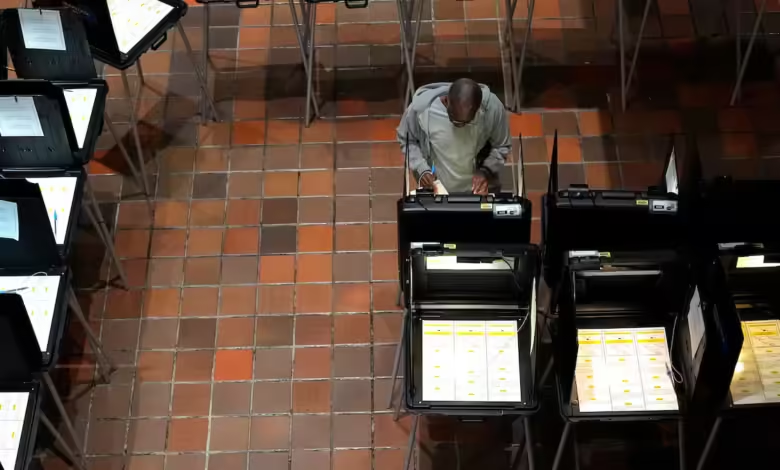Hoaxes don’t stop early voting: 14 million Americans have already cast their ballot




FAST DOWNLOAD
The U.S. election is set for November 5, but it has already begun. On Monday, Texas and most counties in Florida, along with Alaska, Arkansas, Connecticut, Idaho, North Dakota and South Carolina opened in-person early voting. Only a handful of states are yet to enable in-person early voting, although they are some of the most densely populated, such as New York or New Jersey. So far, almost 14 million citizens (7% of the census) have cast their ballot.
In total, just under a third of the country’s voters — a little more than 57 million, according to data compiled by The New York Times — have requested absentee ballots. That number would be a record if we didn’t consider the anomaly of the 2020 election, which was defined by the restrictions imposed by the Covid pandemic, and which offers indications that this year’s turnout is on track to be historic.
In Texas, however, the story is a bit different. Only 133,713 people have requested an absentee ballot, less than 1% of voters. But this fact may say less about voter enthusiasm and more about the border state’s restrictions on voting methods, especially for minorities — including measures against mail-in voting and extended polling station hours, as well as campaigns to boost voter registration.
This time, as has been the case since 2016 when former president Donald Trump ushered in the era of hoaxes and distrust in American democracy, some officials in Texas have been peddling the lie about “illegal voting” in which millions of undocumented immigrants will allegedly vote in these elections. On the strength of this claim, Governor Greg Abbott and State Attorney General Ken Paxton have launched a crusade against voting in recent months. With the start of early voting on Monday, the attempts at “suppressing” the vote, a term often used to describe a set of practices that hinder voting, especially by minorities who tend to vote for the Democratic Party, are considered to be over. Everything indicates that Texas will continue to be a Republican state, and that the electoral tricks of which it is usually one of the main exponents continue to work.
Across the Gulf of Mexico, in Florida, almost a quarter of the electorate has requested to vote early. Starting Monday, more than three million Floridians can elect their new president, as well as vote for their representatives in Congress and several amendments to the state constitution, including one that would protect the right to abortion and one that would legalize marijuana in the state.
Despite warnings of alleged fraud aired earlier this year, and the distrust of mail-in voting that has taken hold since conspiracy theories began circulating at the last election, by Monday 7% of the national census had already voted. In practice, every vote counts, and in this very tight election both parties have promoted voting in all its forms. In Pennsylvania, for example, Republicans have spent more than $10 million to persuade citizens to vote by mail in November. But so far, the number of requests made by registered Democrats in the state has far exceeded those made by Republicans. Likewise, during a campaign event on Monday in North Carolina, Trump acknowledged that he has not seen any evidence of electoral interference, despite his numerous previous contradictory comments.
In fact, in all the swing states early turnout has been above average. In Georgia and North Carolina, records have been broken: in the former, 1,425,000 people have already cast their ballot, 20% of voters, while in the latter, more than one million ballots have been cast — 16% of voters — in just four days. In Michigan, more than 1,018,000 people have voted (13%), in Pennsylvania over 787,000 (10%), in Nevada more than 187,000 (10%), in Arizona over 398,000 (9%) and in Wisconsin more than 305,000 (9%).
This, despite the fact that Georgia and North Carolina were among the states that made changes to their early voting rules in recent years. In Georgia, the Republican legislature and governor passed a sweeping law that shortened the time to apply for a mail-in ballot, imposed strict new ID requirements for those ballots, and significantly limited the availability of mail-in ballot drop boxes. North Carolina has added similar restrictions, sending mail-in ballots to voters two weeks late this year after a court ordered Robert F. Kennedy’s name removed at the last minute. Hurricane Helene also posed problems for voters in the state, causing significant damage and accessibility problems at 10 early voting centers.






